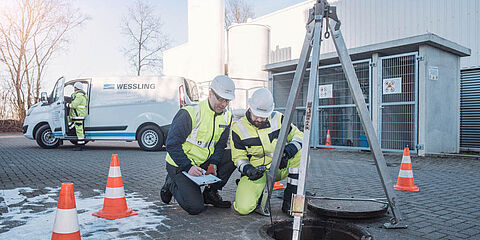Legal compliance check: regulatory conformity for your company
In complex decisions, the company management is always also responsible for adhering to the specifications of environmental, energy and occupational health and safety law.

With a legal compliance check and audit, our experts support you in systematically determining and adhering to the growing number of environmental and occupational health and safety regulations, as well as the regulations of the employer's liability insurance association for your company.
Companies are very familiar with the regulations of their core business. The situation is often different in the case of environmental law requirements and legal regulations in the field of occupational safety and health protection. This is where legal compliance checks, corresponding audits or management systems come into play. Legal compliance means that companies adhere to legal specifications in all areas. This also applies to foreign branches, which have to adapt to the law applicable there.
Legal security through systematic legal compliance checks
The systematic legal compliance check by WESSLING is an established tool for detecting possible deviations and deriving measures tailored to your company with plants, procedures or processes. The recommendations provide you with the basis for recognising action potential to sustainably optimise structures and processes. The legal register enables you to show interested third parties such as supervisory authorities that you are determining and meeting the requirements.
Our services in the field of legal compliance management
Our services in the field of legal compliance management
Approval procedures
Approval procedures
Plant operators, industry and investors have to meet numerous official obligations. Our compliance audit and our many years of experience, in-depth knowledge and strong decision-making skills ensure that your projects proceed according to plan and are successful.
The generation and handling of waste, waste water, emissions, hazardous substances, plants and machines or the consumption of energy and water are subject to a variety of specifications. The aim of this is to protect the environment and human beings from harmful effects wherever possible. The environmental and occupational health and safety aspects must also be taken into consideration in approval procedures, according to the Federal Pollution Control Act (BImSchG), for instance, and the related obligations. These include environmental impact assessments or initial status reports, amongst others.
The new construction, modification or extension of an industrial plant may require an approval procedure under immission control law in addition to the actual planning, necessitating investments in the plant and the operational organisation until the plant is ready for approval. Clarity concerning the requirements should therefore be established at an early stage.
Your approval process in safe hands
The WESSLING experts recommend giving consideration to the aspects of a possible approval procedure in good time during the early project planning phase in order to initiate a smooth project flow and avoid unnecessary expenses. Our many years of experience, in-depth knowledge and strong decision-making skills ensure that your projects proceed according to plan and are successful.
Efficient authority management for faster approval procedures
WESSLING coordinates the requirements of approval authorities and the concerns of investors or plant operators for you. For the implementation of your project, we support you in drawing up the approval application for the responsible authority. Our competence ensures avoiding delays in the procedure due to formal errors. Our portfolio also includes services as part of the environmental impact assessment (EIA) and other checks as required.
IED Directive and initial status report (ISR)
The IED Directive and initial status report (ISR) result in further obligations on plant operators and industry. WESSLING deals from the very beginning with the requirements of the IED Directive, and is particularly familiar with the topic of the ISR and the current status of the discussion.
Further information about our services concerning the IED Directive and the ISR is available here.
Our services in the field of legal compliance management
Risk analyses
Risk analyses
With the evaluation of environmental and safety aspects, WESSLING offers you the entire spectrum of knowledge to minimise risks for businesses through proper hazardous material storage and the correct handling of contaminated sites and harmful building materials, but also through adherence to legal regulations in production.
Experts from all relevant specialist areas are brought together to form teams for you depending on project requirements.
WESSLING checks the following topic areas for you:
- Contamination in buildings by pollutants inherent in building materials (asbestos, PCB, wood preservatives, etc.) and by inputs from production (contamination by oils, greases, degreasing agents, heavy metals, etc.)
- Environmental risks in the form of emissions and immissions as well as those arising from production and work process deviations from applicable regulations and ordinances (compliance check)
- Contaminated sites in soil, soil air and groundwater
- Technical facilities for fire protection and occupational safety as well as for the storage of hazardous materials
Legal specifications for risk analyses
Risk analyses and risk determination are an effective way for companies to achieve an appropriate level of safety.
On the basis of potential hazards, companies that are subject to the 12th Federal Immission Control Ordinance (BImSchV) must implement the precautions necessary to prevent incidents and minimise damage in the event that such incidents occur. Risk determination and risk analysis are therefore legally specified for companies that exceed certain material quantity thresholds.
Only risk determination and risk analysis that are coordinated to the organisation and its context enable the meaningful derivation of protective and contingency measures. The method used to determine risks and to analyse hazards must be transparent and the findings obtained must be comprehensible.
We conduct an appropriate risk analysis for our business partners, i.e. the risks, activities and complexity of the respective organisation are taken into consideration. We evaluate the existing protective and contingency measures on this basis and derive sensible measures together with our customers.
Safety reports and other documents
Risk determination and the risk analysis form the basis for deriving appropriate measures for preventing incidents or limiting the effects of incidents. Depending on whether quantity thresholds are reached or exceeded as per 12th BImSchV, documentation such as the safety report must be prepared; this includes risk determination and the risk analysis, the safety management system or alarm and hazard prevention plans. The safety management system can be based on existing structures (e.g. according to DIN EN ISO 14001, EMAS).
Our services in the field of legal compliance management
Safety for substances and chemicals, REACh
Safety for substances and chemicals: REACh, SVHC and GHS/CLP
The EU chemicals policy assigns important tasks to virtually all companies, as is the case with the REACh regulation. WESSLING supports you with the expertise offered by a team of specialists in exposure assessment and substance evaluation, for instance.

EU regulation 1907/2006 (REACh) regulates the registration, evaluation and authorisation of chemicals. The risks and operational effort can be minimised by tailored preparation and effectively meeting the arising obligations. One important topic of the REACh regulation is substances of very high concern (SVHC).
Classification and identification of GHS/CLP
The rules for the classification and identification of substances and mixtures (GHS/CLP), which are also part of our consulting portfolio, are additionally very important in this context.
The protection of your confidential production and site data is a matter of course for us, and is ensured through corresponding company agreements, technical facilities and external data protection checks.
Our services concerning REACh
- Safeguarding of your core business through adherence to all legal requirements and deadlines
- Ensuring procurement and delivery capability
- Image enhancement through offensive proactive use of REACh
- Product and raw material optimisation
Our range of services in the field of substances and chemicals
- Supplier and customer communication
- Implementation of REACh in the operational process
- Determination of all required substance data from databases, etc.
- Performance of the analyses required under GLP
- Creation of substance dossiers and performance of registration through IUCLID 6
- Substance safety report
- Exposure scenarios
- Consultation in consortia (moderation, data protection)
- Creation of REACh-conformant safety data sheets
- Analysis of products for SVHC
Our services in the field of legal compliance management
Environmental impact assessments
Environmental impact assessments
The purpose of an environmental impact assessment as a dependent part of an administrative procedure is to implement effective environmental precautions within the framework of specific projects. The EIA obligation is determined by the responsible authority on the basis of suitable information provided by the project developer.
Based on the German Environmental Impact Assessment Act (UVPG), the performance of an environmental impact assessment is required for certain projects subject to determination by the authority. The likely environmental impacts associated with the project are documented in the EIA report. In order to act expediently, it is advisable to involve the responsible authority early on in the process to determine the content, scope and level of detail of the necessary information and also to coordinate other aspects of the procedure.
WESSLING prepares the required documents as part of an environmental impact assessment (EIA). We support you in the preparation, planning and moderation of scoping and other dates for consultation and information, supplement approval documents, prepare expert reports and other statements and undertake application management.
The purpose of this is to adequately fulfil the purpose of the EIA and to take into account the expectations and needs of all parties involved to the required extent.
Your contact
- Anfragenmanagement
- +49 2505 89 210
- beratung@wessling-ce.de
Results and goals of the legal compliance check
We carry out an assessment of the actual situation (LC audit) on site. The regulations and necessary duties to act can be documented transparently in a site-specific legal register. Not least within the framework of the various management systems, this is proof that the company has introduced and implemented a procedure. Each register is therefore an individual solution with different information depth, into which an approval register can be integrated.
To ensure sustainable success above and beyond the audit and legal register, we regularly train your responsible employees and offer an update service for the legal register. The legal register is thus the basis for specific action recommendations and measures.
Our range of services:
- Legal compliance audits
- Legal register/approval register
- Legal register update service
- Authorities management
- Employee workshops and training
- Development of procedures/processes



